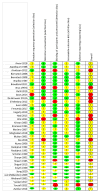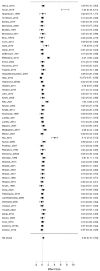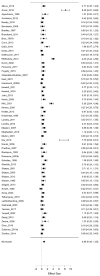The Effectiveness of Psychological Interventions for Rheumatoid Arthritis (RA): A Systematic Review and Meta-Analysis
- PMID: 36984004
- PMCID: PMC10057722
- DOI: 10.3390/life13030849
The Effectiveness of Psychological Interventions for Rheumatoid Arthritis (RA): A Systematic Review and Meta-Analysis
Abstract
Rheumatoid arthritis (RA) is a long-term disorder that significantly impairs somatic, emotional, and psychological functioning. The objective of this review is to identify, appraise, and synthesize the effects of psychological interventions (e.g., cognitive behavioral therapy (CBT), emotional disclosure (ED), group therapy (GT), mindfulness (M), patient education (PE), and relaxation (R)) on biopsychosocial outcomes in the treatment of rheumatoid arthritis (RA). A systematic search of all relevant existing randomized clinical trials (RCTs) was conducted using the following online bibliographic databases: JSTOR, PubMed, PsycNET, and The Cochrane Library. Reference lists were searched for additional reports. The Cochrane Risk of Bias tool (RoB 2.0) was used to assess the risk of bias in the included studies. After the selection process, 57 articles were included and 392 were excluded. Three separate meta-analyses were conducted involving psychological interventions as the main variables, showing: (1) significant positive medium effect sizes for average values (Hedges-g = 0.399, Z = 0.399, p = 0.009); (2) significant positive large effect sizes for maximum values (Hedges-g = 0.856, Z = 4.223, p < 0.001); and (3) non-significant results for minimum values (Hedges-g = -0.047, Z = -0.335, p = 0.738). These results demonstrate that, when grouped, psychological interventions are, on average, moderately effective in treating RA. Overall, this review shows consistent, supportive evidence that psychological interventions can significantly contribute to the standard medical care of RA patients. However, more high-quality, large-sample RCTs still need to confirm these findings.
Keywords: CBT; biopsychosocial treatment; chronic pain; evidence-based; mindfulness; multimodal therapy; patient education; relaxation.
Conflict of interest statement
The authors declare no conflict of interest.
Figures








Similar articles
-
Behavioural modification interventions for medically unexplained symptoms in primary care: systematic reviews and economic evaluation.Health Technol Assess. 2020 Sep;24(46):1-490. doi: 10.3310/hta24460. Health Technol Assess. 2020. PMID: 32975190 Free PMC article.
-
The future of Cochrane Neonatal.Early Hum Dev. 2020 Nov;150:105191. doi: 10.1016/j.earlhumdev.2020.105191. Epub 2020 Sep 12. Early Hum Dev. 2020. PMID: 33036834
-
Technology-based and digital interventions for intimate partner violence: A systematic review and meta-analysis.Campbell Syst Rev. 2022 Aug 27;18(3):e1271. doi: 10.1002/cl2.1271. eCollection 2022 Sep. Campbell Syst Rev. 2022. PMID: 36909881 Free PMC article. Review.
-
Psychological therapies for the treatment of depression in chronic obstructive pulmonary disease.Cochrane Database Syst Rev. 2019 Mar 6;3(3):CD012347. doi: 10.1002/14651858.CD012347.pub2. Cochrane Database Syst Rev. 2019. PMID: 30838649 Free PMC article.
-
Psychological interventions for reducing depressive symptoms in rheumatoid arthritis patients: a systematic review and network meta-analysis.Psychol Health Med. 2025 Mar 28:1-19. doi: 10.1080/13548506.2025.2482949. Online ahead of print. Psychol Health Med. 2025. PMID: 40153848
Cited by
-
Predicting comorbid mental health difficulties in people with autoimmune arthritis.Rheumatol Int. 2024 Mar;44(3):459-468. doi: 10.1007/s00296-023-05519-8. Epub 2024 Jan 18. Rheumatol Int. 2024. PMID: 38236426 Free PMC article.
-
Chinese guidelines for the diagnosis and treatment of rheumatoid arthritis: 2024 update.Rheumatol Immunol Res. 2025 Jan 9;5(4):189-208. doi: 10.1515/rir-2024-0028. eCollection 2024 Dec. Rheumatol Immunol Res. 2025. PMID: 39802551 Free PMC article.
-
Real-World Safety and Efficacy of Targeted Therapies in Rheumatoid Arthritis: A 5-Year, 5130-Case Follow-Up from FIRST Registry.Rheumatol Ther. 2025 Jun;12(3):561-580. doi: 10.1007/s40744-025-00762-w. Epub 2025 Apr 21. Rheumatol Ther. 2025. PMID: 40257743 Free PMC article.
-
Network analysis of depression and anxiety symptoms in Chinese rheumatoid arthritis patients.PeerJ. 2023 Nov 6;11:e16356. doi: 10.7717/peerj.16356. eCollection 2023. PeerJ. 2023. PMID: 37953775 Free PMC article.
-
Association of optic neuritis with incident depressive disorder risk in a Korean nationwide cohort.Sci Rep. 2025 Mar 5;15(1):7764. doi: 10.1038/s41598-025-92370-5. Sci Rep. 2025. PMID: 40044803 Free PMC article.
References
-
- Martin N.H., Ibrahim F., Tom B., Galloway J., Wailoo A., Tosh J., Lempp H., Prothero L., Georgopoulou S., Sturt J., et al. Does Intensive Management Improve Remission Rates in Patients with Intermediate Rheumatoid Arthritis? (The TITRATE Tri-al): Study Protocol for a Randomised Controlled Trial. Trials. 2017;18:591. doi: 10.1186/s13063-017-2330-8. - DOI - PMC - PubMed
Publication types
LinkOut - more resources
Full Text Sources
Miscellaneous

